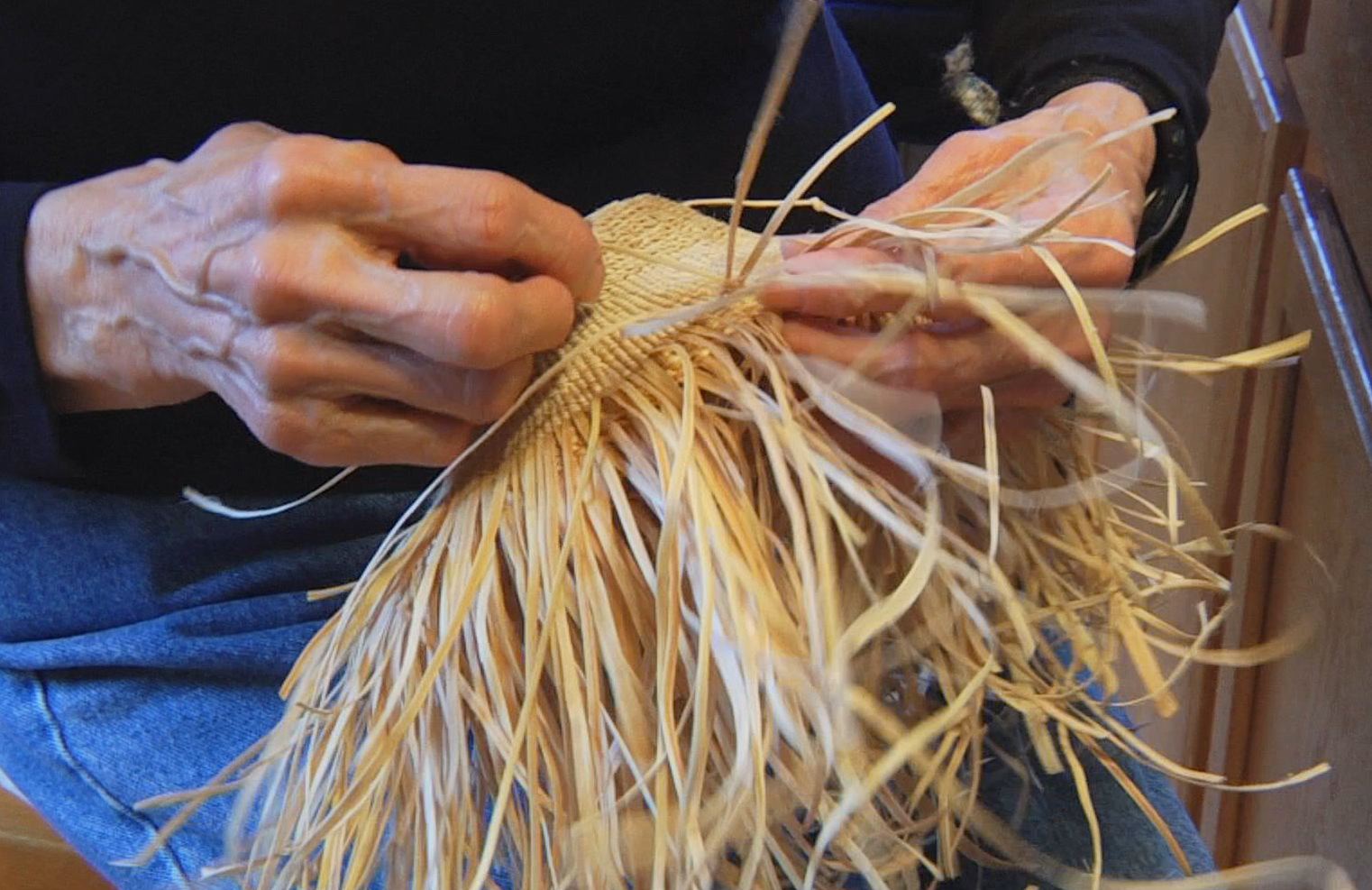The Film
Tracing Roots is a heartfelt glimpse into the world of Haida elder and master weaver Delores Churchill. The film is a portrait infused with her passion and curiosity. It is also a mystery. Tracing Roots follows Delores on her journey to uncover the origins of a spruce root hat found with Kwäday Dän Ts’ìnchi, also known as the Long Ago Person Found, in a retreating glacier in the Northern Canada. Her search to understand the roots of the woven hat crosses cultures and borders, and involves artists, scholars and scientists. The documentary raises questions about understanding and interpreting ownership, knowledge and connection. After watching a work in progess of Tracing Roots, Delores described it as a story of connection to where we live, the art we make and the people we teach.
Relevant Subject Areas
Anthropology, Archeology, Sociology, Indigenous Studies, Northwest Coast Art, Heritage and History; Art, Culture & Law; Intellectual Property and Repatriation, Museum Studies, Environmental Studies, Alaskan and Canadian Studies, Women and Gender Studies, Aging and Gerontology, Documentary Filmmaking
Appropriate for screenings in
Community Groups, High Schools, Colleges, Museums, Public Libraries, Weaving and Northwest Coast Art Workshops
The Filmmakers
Delores Churchill, Ilskyalas, is a Haida weaver of baskets, hats, robes, and other regalia. Using such materials as spruce root, cedar bark, wool, and natural dyes, she creates utilitarian and ceremonial objects. Her goal is to teach young people the knowledge and skills related to the weaving tradition, “ because as long as Native art remains in museums, it will be thought of in the past tense. Sharing knowledge assures the art of basketry will survive.”
Delores learned to prepare materials and to weave from her mother, Selina Peratrovich, a nationally recognized master weaver. Her mother asked Delores to burn her baskets for the first five years of her apprenticeship. "I am well known for my baskets," Peratrovich told me. "If you say you learned from me, you better be good."
Each time she views the weavings of her ancestors Delores says she is “overwhelmed by the beauty and spirit of each.” She describes herself as fortunate to study Tlingit basketry with Esther Littlefield and Annie Jacobs; Tsimshian basketry with Flora Mather; Aleut basketry with Agnes Thompson; birch bark basketry with Belle Deacon; Chilkat weaving with Jennie Thlunaut; and Chilkat apron and geometric robe weaving with Cheryl Samuel. “When I began learning to weave wool from Cheryl I was obsessed. I breathlessly said to Cheryl, ‘I can’t eat. I can’t sleep. It is like I am in-love!”
Delores has been honored for her role in Haida basket weaving and perpetuation of the Native arts with an Honorary Doctorate of Humane Letters by the University of Alaska Southeast, a Rasmuson Foundation Distinguished Artist Award, and the Alaska Governor’s Award for the Arts. She received a National Heritage Fellowship Award from the National Endowment of the Arts in 2006. Other awards include a Sealaska Heritage Foundation study grant, a First Peoples Fund Award and The Lisle Fellowship in Guadalajara, Mexico. She’s lectured, taught basketry and demonstrated in Canada, England, Washington D.C., West Germany, Honolulu, Kansas City, and Chicago. Delores has also worked as a researcher and consultant, helping curators identify works in museum collections
Photo credit: Hall Anderson
Ellen Frankenstein is an independent director, producer and media artist. She directs the non-profit, Artchange, Inc. Frankenstein's directing credits include Eating Alaska, and No Loitering, Carved from the Heart. She distributes these documentaries through the national collective New Day Films. Ellen is in an active member-owner in New Day, a cooperative and democratically-run organization of independent filmmakers who make and distribute media that educates and inspires. She has organized and taught in community arts and school-based media projects from South Central Los Angeles to Savoonga, Alaska, and has exhibited her still photography nationally and internationally.
Ellen’s work has been supported by a Fulbright-Hays Fellowship, through the Corporation for Public Broadcasting, the Independent Television Service, and grants from the Los Angeles Department of Cultural Affairs, the Alaska Humanities Forum, the National Endowment for the Arts and the Humanities, and the Rockefeller Foundation. She has a Masters in Visual Anthropology from the University of Southern California.
Full production credits
Support the Film
We're not done! Help support our finishing and outreach costs. Donations will help with the expenses of preparing a version of Tracing Roots for broadcast on PBS in Fall 2015, and with otureach costs to make a powerful story available regionally, locally and beyond.
Tracing roots is made possible by support from The Rasmuson Foundation, Alaska Humanities Forum and the National Enowment for the Humanities, The Douglas Dornan Fund, The Sitka Alaska Permanent Charitable Trust, and The Intellectual Property Issues in Cultural Heritage (IPinCH) Research Project. Plus in-kinds and seed funding from the University of Alaska Sputheast and donations from Deborah Lyons, David and Margaret Stewart, Laura Frankenstein Sandra Kincheloe, Karen Hofstad , Andy Miller, Martha Rosen, Artist Cove Gallery, the Sitka Film Society, and others.




